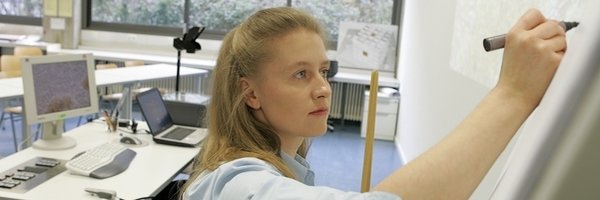
“Here at the Institute, I have close contact with laboratory work and can pass my knowledge on to young people - which is something I enjoy very much.”
You are head of training for biology lab technicians here at the Institute, where you are currently in charge of twelve trainees. What kind of training is provided at a research institute?
Reindl: When the Institute became involved in the training of biology lab technicians in September 2004, it entered completely new territory. In addition to training for the general compulsory qualifications, we offer training for six optional qualifications: molecular biology, biochemistry and immunology, cell culture engineering, pharmacology and zoology, and microbiology. Thanks to the support of the Max Planck Institute of Psychiatry we can also offer the diagnostics module required by the training regulations. In the first eight weeks of their training, the students learn basic techniques with us in the teaching laboratory, such as pipetting, weighing, creating dilution series, etc. They then work in the various departments and service groups at the Institute where they generally spend between eight and twelve weeks. The internal training is also complemented by various cooperative arrangements with other research institutions and companies in the industry.
What was it like for you when the Institute first became involved in training, and how do you select your trainees?
Reindl: No preparatory work had been done on the course content when we started but, thankfully, I was provided with an almost fully-equipped teaching lab. Prior to taking up my position officially, I had already carried out the initial round of applicant interviews with my colleagues at the Institute. In recent years, we have had an average of 200 applications per year for four trainee positions. The number of applicants has now unfortunately declined due to the lower birth rates. Applicants with a very good secondary school qualifications (Realschulabschluss) or a good school-leaving certificate (Abitur) have the best chances. It is also important that the members of the small group of trainees get on well with each other. For this reason, the shortlisted applicants are put through their paces during a four-day practical training period, in which the candidates carry out various experiments in small teams.
A total of 16 weeks of practical training takes place in the teaching laboratory. Are there also theoretical units that are not held at the training college?
Reindl: The range of subjects covered by the training college needs to be very broad. As part of the on-the-job training at the Institute, certain topics are dealt with in greater depth – or in the context of work at the Institute – from a different perspective, and some things simply have to be explained again. Because there are no textbooks available for biology lab technicians, I create the teaching material myself. This has to be coordinated with the overall curriculum and the examinations carried out by the Chamber of Industry and Commerce (IHK). Right from the start of our training course, our trainees have attained good results in the IHK’s final examinations. Two thirds of them achieved more than 81 out of 100 possible points. This corresponds to a grade of 2 (“good” in the German academic grading system).
You also trained as a biology lab technician after your school leaving certificate. Is learning still important to you, and what do you think of the developments in the profession?
Reindl: New techniques and equipment are always being introduced into laboratory work. So you have to keep up to date. As a result, I have set myself the goal of taking part regularly in further training courses. To improve my teaching skills, which are important for my role as head of training, I completed a two-year course in further education (IHK). I also value the exchange of experience with colleagues. We have noticed that the job of lab technician is becoming more and more demanding. I would say that the theoretical knowledge required today is equivalent to the level of the intermediate examination at university. Therefore, a general certificate of education (Hauptschulabschluss) is no longer sufficient as an entry qualification for this three-and-a-half-year training course. Students with good to very good results in the sciences in the secondary school certificate (Realschulabschluss) and students who have majored in biology at advanced second level (Abitur) are at a distinct advantage.
Thank you very much for your cooperation Ms. Reindl!
Katrin Reindl was interviewed by Barbara Abrell and Christina Beck